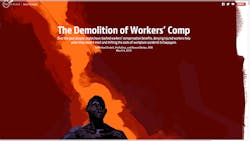ProPublica and NPR Document the ‘Demolition of Workers’ Comp’
Cutbacks to workers’ compensation benefits have been so dramatic in some states that they “virtually guarantee” that an injured worker will “plummet into poverty,” according to an investigation by ProPublica and NPR. Thirty-three states have cut benefits to workers injured or made ill by work, or have made it more difficult to qualify for benefits.
“The Demolition of Workers’ Comp,” written by Michael Grabell of ProPublica and Howard Berkes of NPR, notes that while employers are paying the lowest rates for workers’ compensation in decades and insurance companies earned a 18 percent return in 2013, workers are suffering. No longer able to work and fighting with insurance companies, workers and their families often are forced to seek public aid, like food stamps, in order to make ends meet.
The report discusses a study by J. Paul Leigh, of the University of California, Davis, that estimated “workers’ comp covered less than a third of injured workers’ medical costs and lost earnings in 2007 and that government programs like Social Security, Medicare and Medicaid had shelled out about $30 billion to fill part of the gap.”
In other words, taxpayers are stuck with a bill that should have been paid by the insurance companies and the employers.
In its report, “Adding Inequality to Injury: The Costs of Failing to Protect Workers on the Job,” released March 4, OSHA claims that that on average, a worker who is seriously injured will earn 15 percent less over a 10-year period and will bear 50 percent of the costs associated with that injury.
“The costs of workplace injuries are borne primarily by injured workers, their families and taxpayer-supported components of the social safety net,” said Dr. David Michaels, assistant secretary of Labor for Occupational Safety and Health.
About the Author

Sandy Smith
Sandy Smith is the former content director of EHS Today, and is currently the EHSQ content & community lead at Intelex Technologies Inc. She has written about occupational safety and health and environmental issues since 1990.
